Politics
Australia mushroom murderer Erin Patterson jailed for minimum of 33 years
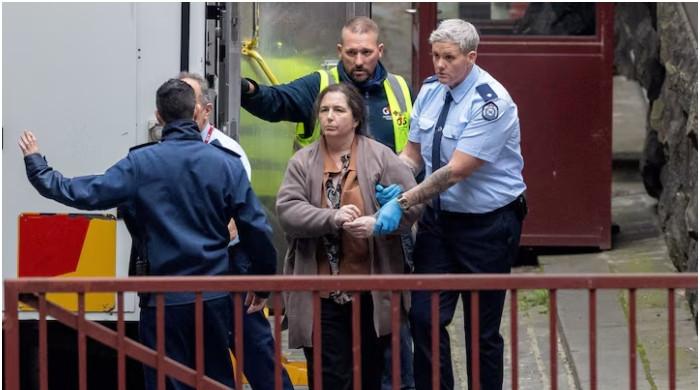
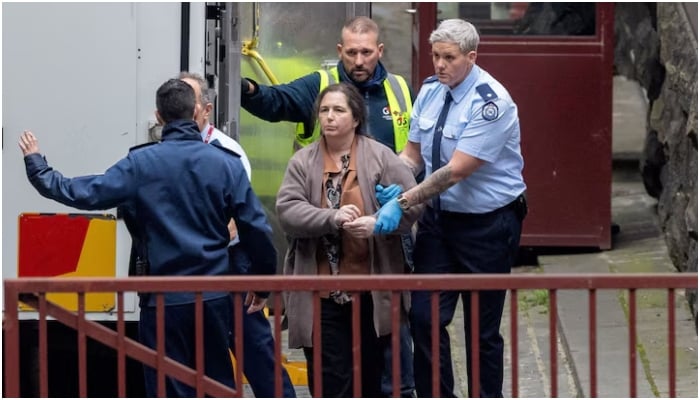
An Australian woman convicted of murdering three elderly relatives of her estranged husband with a meal containing poisonous mushrooms was sentenced to a minimum of 33 years in prison on Monday, in one of the longest jail terms ever given to a woman in the country.
The presiding judge said Erin Patterson showed no pity for her in-laws after she served them individual portions of Beef Wellington laced with death cap mushrooms.
Patterson was found guilty in July of killing her mother-in-law, Gail Patterson, father-in-law, Donald Patterson and Gail’s sister, Heather Wilkinson, in a case that has been globally followed and dubbed the Leongatha mushroom murders.
A jury also found the 50-year-old guilty of the attempted murder of Ian Wilkinson, Heather’s husband, who survived the 2023 meal at Patterson’s home in Leongatha, a town of about 6,000 people, some 135 km (84 miles) southeast of Melbourne.
Justice Christopher Beale said the substantial planning of the murders and Patterson’s lack of remorse meant her sentence should be lengthy.
“The devastating impact of your crimes is not limited to your direct victims. Your crimes have harmed a great many people,” he said at the sentencing hearing at the Supreme Court of Victoria in Melbourne.
“Not only did you cut short three lives and cause lasting damage to Ian Wilkinson’s health, thereby devastating the extended Patterson and Wilkinson families, you inflicted untold suffering on your own children, whom you robbed of their beloved grandparents.”
Ian Wilkinson thanked the police and prosecutors who brought Patterson to justice, as well as medical teams that treated him and the other victims.
“We’re thankful that when things go wrong, there are good people and services and systems available to help us recover,” he said outside the court.
Solitary confinement
At a pre-sentencing hearing last month, Patterson’s barrister Colin Mandy urged Beale to impose a non-parole period on the sentence, meaning she would have the possibility of eventual release, as her “notorious” reputation would make prison more onerous for her than the average offender.
A corrections officer previously told the court Patterson was being kept in isolation for her own safety, and was permitted contact with only one other prisoner who is in jail for terrorism offences.
In his sentencing remarks, Beale said he had taken Patterson’s isolation into account.
“You have effectively been held in continuous solitary confinement for the last 15 months, and at the very least there is a substantial chance that for your protection you will continue to be held in solitary confinement for years to come,” Beale said.
Including time already served, Patterson will have just turned 82 before she can be considered for release.
The prosecution argued Patterson should never be released.
Patterson, who maintained her innocence throughout the trial and said the poisonings were accidental, has 28 days to appeal her sentence. She has not indicated whether she will do so.
Patterson’s non-parole period of 33 years is the longest ever for a woman convicted of murder in Victoria.
Only one woman in Australia has ever received a life sentence without the possibility of parole.
Australia does not have the death penalty.
Media frenzy
The deaths devastated the close-knit rural community of Korumburra, where all the victims lived.
The court received a total of 28 victim impact statements, of which seven were read publicly at last month’s hearings.
Ian Wilkinson, a pastor at a local church and the sole surviving guest of the lunch, told last month’s hearing that the death of his wife had left him bereft.
“It’s a truly horrible thought to live with that somebody could decide to take her life. I only feel half alive without her,” he said, breaking down in tears as he delivered his victim impact statement.
The extraordinary media interest in the case, which gripped Australia for much of the 10-week trial, had been traumatic for the family, Erin Patterson’s estranged husband Simon Patterson – who was invited to the lunch but declined – said at the same hearing.
Journalists and television crews from around the world descended on the town of Morwell when the trial began in April, with millions of Australians following proceedings live through one of several popular daily podcasts.
For the first time in its history, the Supreme Court on Monday allowed a television camera into the court to broadcast Beale’s sentencing remarks live due to overwhelming public interest.
The trial has already inspired several books, documentaries, and a drama series, “Toxic”, set to air on state broadcaster ABC.
Politics
Indonesia nursing home fire kills 16: official

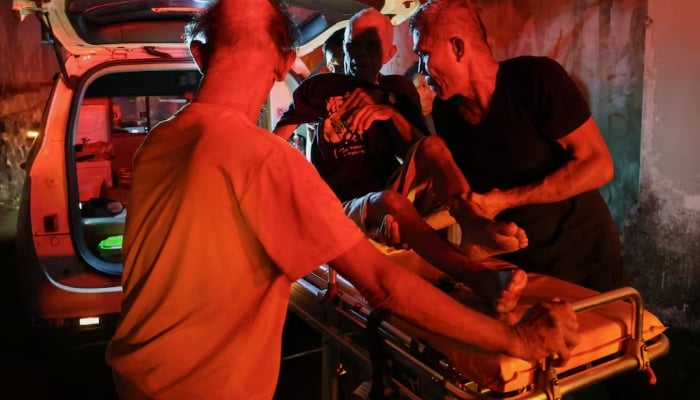
A fire at a nursing home on the Indonesian island of Sulawesi killed more than a dozen people, with three others injured, a local official said Monday.
Firefighters received the report of the blaze at 8:31pm Sunday at a nursing home in the North Sulawesi provincial capital Manado, said the city’s fire and rescue agency chief Jimmy Rotinsulu.
“There were 16 deaths; three (people) had burn injuries,” he told AFP.
Many bodies of the victims were found inside their rooms, Jimmy said, adding that many of the elderly residents were likely resting in their rooms in the evening when the fire broke out.
Authorities managed to evacuate 12 people — all unhurt — and transfer them to a local hospital, he said.
Footage aired by local broadcaster Metro TV showed the fire engulfing the nursing home, while locals helped to evacuate an elderly person.
Deadly fires are not uncommon in Indonesia, a Southeast Asian archipelago of more than 17,000 islands.
A fire tore through a seven-storey office building in Indonesia´s capital Jakarta this month, killing at least 22 people.
In 2023, at least 12 people were killed in the country´s east after an explosion at a nickel-processing plant.
Politics
Deal was closer than ever to end Russia’s invasion of Ukraine: President Trump says
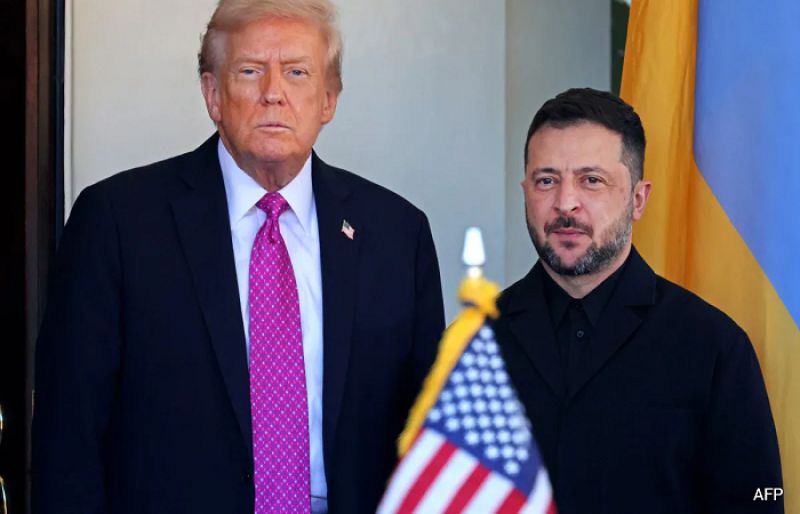

US President Donald Trump said that a deal was closer than ever to end Russia’s invasion of Ukraine but reported no apparent breakthrough on the flashpoint issue of territory after new talks with the warring countries’ leaders.
Trump, who had promised a peace deal on day one of his nearly year-old presidency, said it would become clear within weeks whether it was possible to end the war that has killed tens of thousands of people since February 2022.
In a pre-New Year’s diplomatic sprint, Trump brought Ukrainian President Volodymyr Zelensky to Florida, where the two met with top aides over lunch, a day after Russia unleashed major new attacks on residential areas of the capital Kyiv.
Much like when Zelensky last met Trump in October, Russian President Vladimir Putin also spoke shortly beforehand by telephone with the US leader, who immediately insisted that Moscow was “serious” about peace despite the assault.
“I really believe we’re, Mr President, probably closer than — far closer than — ever before with both parties,” Trump said with Zelensky at his side in the tea room of his Mar-a-Lago estate.
“Everybody wants it ended,” Trump said.
After their talks, Zelensky and Trump spoke jointly by telephone with key European leaders, who have been particularly alarmed about any decisions that would embolden Russia.
Zelensky said that he and European leaders could return jointly for talks with Trump in Washington in January.
The Ukrainian president stayed studiously polite throughout his visit, mindful of his disastrous White House meeting on February 28 where Trump and Vice President JD Vance publicly berated him for not being sufficiently grateful.
Territory impasse
Trump, for all his stated optimism, gave few details on the progress he cited, instead digressing into familiar grievances about his predecessor Joe Biden, who committed billions of dollars for Ukraine’s defense, and speaking of his own friendly rapport with Putin.
Trump acknowledged continued disagreement between Kyiv and Moscow on territory. The current plan, revised after weeks of intense US-Ukrainian negotiations, would stop the war at the current frontlines in the eastern Donbas region and set up a demilitarized area, while Russia has long demanded territorial concessions.
“It’s unresolved, but it’s getting a lot closer. That’s a very tough issue, but one that I think will get resolved,” Trump said.
Trump offered to address the Ukrainian parliament to promote the plan — an idea, however unlikely, that Zelensky was quick to welcome.
Zelensky has voiced an openness to the revised US plan, marking Kyiv’s most explicit acknowledgement yet of possible territorial concessions, although Ukrainians voters would need to approve it in a referendum.
By contrast, Russia has shown no signs of compromise, as it sees hope in the grinding gains it has made over four years against tough Ukrainian defenses.
The Kremlin in its readout of talks between Putin and Trump called on Kyiv to make a “brave decision” and immediately withdraw troops from Donbas, casting European leaders as the impediment to peace.
“Russia and the United States share the same position which is that the Ukrainian and European proposal for a temporary ceasefire (…) would only prolong the conflict and lead to a resumption of hostilities,” the Kremlin’s diplomatic advisor Yuri Ushakov told reporters.
’90 percent’ agreed by Ukraine
Trump’s advisors have previously floated the idea of offering NATO-like security guarantees to Ukraine, meaning in theory that the alliance’s members would respond militarily if Russia attacks again.
Zelensky said that the peace framework laid out by Trump was “90 percent agreed” and that “US-Ukraine security guarantees: 100 percent agreed.”
Zelensky said the two sides were still finalizing a “prosperity plan” for Ukraine as well as the sequencing of the various actions.
Russia had adamantly rejected any entrance of the former Soviet republic into NATO.
In its latest assault with drones and missiles, Russia knocked out power and heating to hundreds of thousands of residents during freezing temperatures.
“If the authorities in Kyiv don’t want to settle this business peacefully, we’ll resolve all the problems before us by military means,” Putin said on Saturday.
Politics
Trump says Ukraine deal closer but no talks breakthrough
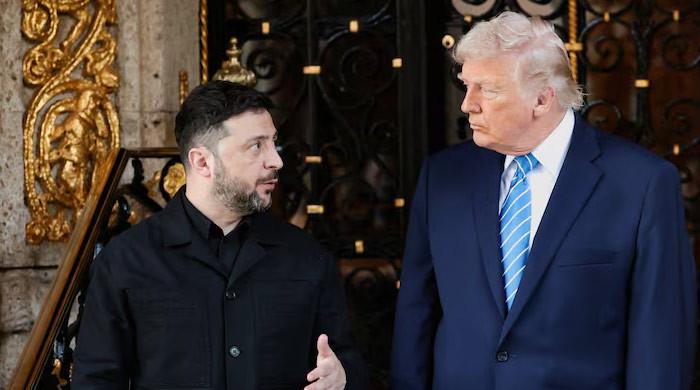

- US and Ukraine “a lot closer” on peace deal: Trump.
- Trump says to be clear within “weeks” if Ukraine war can end.
- Zelenskiy sees agreement on security guarantees for Ukraine.
FLORIDA: US President Donald Trump said Sunday that a deal was closer than ever to end Russia’s invasion of Ukraine, but reported no apparent breakthrough on the flashpoint issue of territory after new talks with the warring countries’ leaders.
Trump, who had promised a peace deal on day one of his nearly year-old presidency, said it would become clear within weeks whether it was possible to end the war that has killed tens of thousands of people since February 2022.
In a pre-New Year’s diplomatic sprint, Trump brought Ukrainian President Volodymyr Zelensky to Florida, where the two met with top aides over lunch, a day after Russia unleashed major new attacks on residential areas of the capital Kyiv.
Much like when Zelensky last met Trump in October, Russian President Vladimir Putin also spoke shortly beforehand by telephone with the US leader, who immediately insisted that Moscow was “serious” about peace despite the assault.
“I really believe we’re, Mr. President, probably closer than — far closer than — ever before with both parties,” Trump said with Zelensky at his side in the tea room of his Mar-a-Lago estate.
“Everybody wants it ended,” Trump said.
After their talks, Zelensky and Trump spoke jointly by telephone with key European leaders, who have been particularly alarmed about any decisions that would embolden Russia.
Zelensky said that he and European leaders could return jointly for talks with Trump in Washington in January.
The Ukrainian president stayed studiously polite throughout his visit, mindful of his disastrous White House meeting on February 28 where Trump and Vice President JD Vance publicly berated him for not being sufficiently grateful.
Territory impasse
Trump, for all his stated optimism, gave few details on the progress he cited, instead digressing into familiar grievances about his predecessor Joe Biden, who committed billions of dollars for Ukraine’s defence, and speaking of his own friendly rapport with Putin.
Trump acknowledged continued disagreement between Kyiv and Moscow on territory. The current plan, revised after weeks of intense US-Ukrainian negotiations, would stop the war at the current frontlines in the eastern Donbas region and set up a demilitarised area, while Russia has long demanded territorial concessions.

“It’s unresolved, but it’s getting a lot closer. That’s a very tough issue, but one that I think will get resolved,” Trump said.
Trump offered to address the Ukrainian parliament to promote the plan — an idea, however unlikely, that Zelensky was quick to welcome.
Zelensky has voiced an openness to the revised US plan, marking Kyiv’s most explicit acknowledgement yet of possible territorial concessions, although Ukrainian voters would need to approve it in a referendum.
By contrast, Russia has shown no signs of compromise, as it sees hope in the grinding gains it has made over four years against tough Ukrainian defences.
The Kremlin in its readout of talks between Putin and Trump called on Kyiv to make a “brave decision” and immediately withdraw troops from Donbas, casting European leaders as the impediment to peace.
“Russia and the United States share the same position which is that the Ukrainian and European proposal for a temporary ceasefire (…) would only prolong the conflict and lead to a resumption of hostilities,” the Kremlin’s diplomatic advisor, Yuri Ushakov, told reporters.
‘90%’ agreed by Ukraine
Trump’s advisors have previously floated the idea of offering NATO-like security guarantees to Ukraine, meaning in theory that the alliance’s members would respond militarily if Russia attacks again.
Zelensky said that the peace framework laid out by Trump was “90% agreed” and that “US-Ukraine security guarantees: 100% agreed.”
Zelensky said the two sides were still finalising a “prosperity plan” for Ukraine as well as the sequencing of the various actions.
Russia had adamantly rejected any entrance of the former Soviet republic into NATO.
In its latest assault with drones and missiles, Russia knocked out power and heating to hundreds of thousands of residents during freezing temperatures.
“If the authorities in Kyiv don’t want to settle this business peacefully, we’ll resolve all the problems before us by military means,” Putin said on Saturday.
-
Sports1 week ago
Alabama turned Oklahoma’s College Football Playoff dream into a nightmare
-

 Entertainment1 week ago
Entertainment1 week agoRare look inside the secret LEGO Museum reveals the system behind a toy giant’s remarkable longevity
-

 Entertainment1 week ago
Entertainment1 week agoIndia drops Shubman Gill from T20 World Cup squad
-

 Tech1 week ago
Tech1 week agoWe Tried and Tested the Best Gifts for Plant Lovers With Our Own Green Thumbs
-

 Sports2 days ago
Sports2 days agoBrooks Koepka should face penalty if he rejoins PGA Tour, golf pundit says
-

 Sports1 week ago
Sports1 week agoPatriots vs. Ravens (Dec 21, 2025) Live Score – ESPN
-

 Politics1 week ago
Politics1 week agoUS intercepts oil tanker off Venezuelan coast, Reports
-

 Business1 week ago
Business1 week agoNeptune Logitek Shares List At 26% Discount, IPO Investors Suffer Nearly Rs 30,000 Losses





